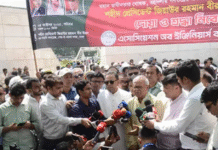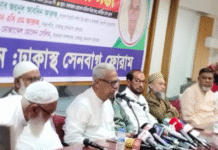Dhaka/Brussels
Bangladesh faces growing political violence in the lead-up to the 2013 elections unless the government takes a more conciliatory approach towards the opposition.
Bangladesh: Back to the Future, the latest report from the International Crisis Group, examines how the Awami League (AL) government, enthusiastically welcomed back to power in 2008 as a beacon of democratic reform, has returned to a familiar pattern of arresting opposition leaders, stacking key political institutions and violating human rights. Its scrapping of a constitutional provision mandating a neutral caretaker administration to oversee elections, over the strong opposition of the rival Bangladesh National Party (BNP), has raised the spectre of political deadlock and prolonged street violence in the lead-up to the polls.
“A small window of opportunity remains for reconciliation, but the ball is in Prime Minister Sheikh Hasina’s court”, says Sidney Jones, Crisis Group’s Senior Adviser on Asia. “If she does not reach out to the opposition, Bangladesh will be back to the zero-sum politics that so many hoped had ended in 2008”.
The report examines how popular enthusiasm over the AL’s landslide victory in 2008, in the fairest elections in the country’s history, has been replaced by disillusionment and fear. Over the last three years, the government has pressed charges against almost all senior BNP leaders and has restricted or banned opposition activity. It has cracked down on the media and politicised the security forces and judiciary.
Support for the BNP has risen in response, and it has regained enough strength to sustain a prolonged fight with the government, raising fears of a political standoff similar to the one in 2006 that led to military intervention. On 12 March, it brought 100,000 supporters to Dhaka for a rally, despite government efforts to shut down the country’s transport links for three days. At the rally, BNP leader Khaleda Zia gave the government a deadline of 10 June to reinstate the caretaker system. When the deadline passed, she called for nationwide agitation. Unless the government moves toward a compromise on the caretaker issue, violence in the streets is likely.
The military will play a pivotal role in the outcome of any electoral deadlock. It is visibly restive, and while the likelihood of a full-scale coup is not high, military intervention could get public support if there were to be pitched street battles in the capital.
“The capacity to forge a compromise across the parties has not been completely destroyed but it will require much more statesmanship than we have seen thus far”, says Paul Quinn-Judge, Crisis Group’s Acting Asia Program Director. “Sheikh Hasina could jump-start the process by releasing detained BNP leaders”.
Without such a move, Bangladeshi democracy is doomed to more of the same.
Source: International Crisis Group









